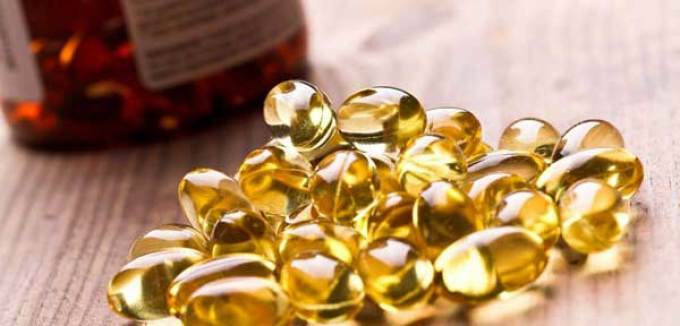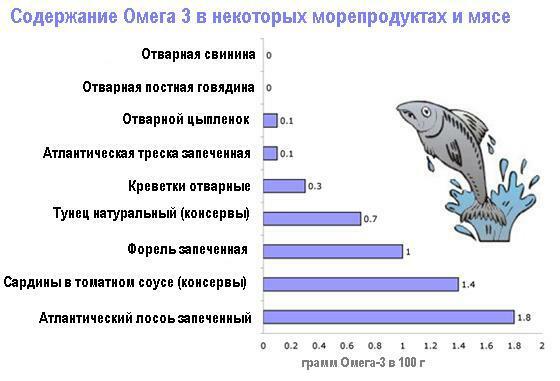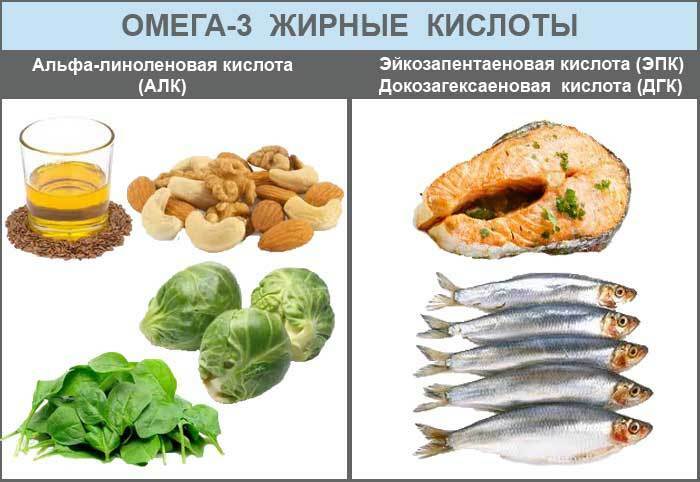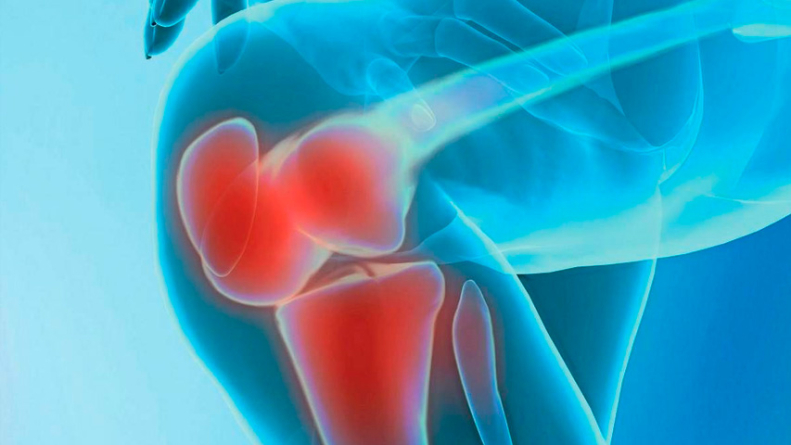What is the norm of Omega-3 for men and women? How useful are acids of this class for specific diseases? Who should not drink Omega-3 supplements?
Contents of
- Omega-3 for which it is useful for men and women, for what purpose?
- Omega-3 for men. Omega-3 with prostatitis
- Omega-3 for women
- VIDEO: Fish oil. Natural remedy
- Daily norm of Omega-3 for women and men
- Omega-3: instructions for use for men and women
- Which products contain Omega-3?
- Omega-3 in linseed oil, in fish
- VIDEO: HOW TO INCREASE OMEGA-3 CONSUMPTION?
- Omega-3 - effect on the vessels of the heart and brain
- Omega-3 and pressure
- VIDEO: How does Omega-3 affect the heart, liver, brain, joints?
- Omega-3 for joints and spine
- Omega-3 for diabetes mellitus
- VIDEO: What is the use of flaxseed oil for diabetes mellitus?
- Omega-3 lowers cholesterol
- How does Omega-3 affect the beauty and youth of the skin, nails, hair?
- VIDEO: Healthy skin, Omega-3 for facial skin
- Omega-3: effect on the liver
- Omega-3 and vision
- Omega-3 reduces inflammation in the body
- Omega-3 - prevention of Alzheimer's disease
- Omega-3 for weight loss. Omega-3 sports nutrition
- Is it possible to drink Omega-3 constantly?
- Omega-3 - Contraindications
- VIDEO: Omega-3( Essential Fatty Acids, Polyunsaturated Fatty Acids).10 facts
In the article " Omega-3 - polyunsaturated fatty acids Eicosapentaenone EPA and Docosahexaenic DHA: their role in the body. A healthy ratio in the body of Omega-3 and Omega-6 "we got acquainted with acids of the Omega-3 class - docosahexaenoic and eco-sapentaenoic. Now let's look at the details of how much you need to drink them to a healthy person, during a particular illness, and what is the daily intake of useful acids in which foods they are kept.
Omega-3 for which it is useful for men and women, why take?
The instructions for Omega-3 preparations do not specify differences in their use by men and women. Nevertheless, bioadditives are perceived differently by organisms of representatives of opposite sexes.
IMPORTANT: Several years ago in Australia, scientists conducted a large-scale study. In the course of it, the group consisted of 160 people, men and women aged 50 to 70 years, whose health was not burdened by serious chronic diseases. For almost 4 months they took a different dosage of Omega-3 acids( 240 mg EPA and DHA, 480 mg EPA and DHA), as well as placebo. As a result of the study it was possible to find out that women better absorb docosahexaenoic acid, and men - eicosapentaenoic.
At the same dosage, Omega-3 is better absorbed by the female body. The normal DHA and EBC in erythrocytes persists in women for a certain period after stopping the use of Omega-3 supplement, and for men only if it is regularly consumed.
It becomes clear that it is necessary to revise the consumption norm of Omega-3, which today is not differentiated by gender.
Let us consider in more detail how the fatty acids of this class affect male and female health.
Omega-3 for men. Omega-3 with prostatitis
As practice shows, men are less concerned about their own health than women. Nutrition and lifestyle in the stronger sex are very often not the most correct and healthy.
- Forced to be a getter, a man often lives in chronic stress, chronically overworked.
- In the diet, men are often dominated by harmful fats and simple carbohydrates.
- Men are more likely to have bad habits than women.
 Omega-3 is recommended for men to prevent prostatitis and prostate cancer.
Omega-3 is recommended for men to prevent prostatitis and prostate cancer. Arguments in favor of the necessity of taking Omega-3 by men are the following facts:
- Polyunsaturated fatty acids of this class reduce the risk of death from cardiovascular diseases, namely, according to WHO statistics, most men die. According to the results of studies conducted by scientists among men who survived myocardial infarction, it was found that the recurrence of acute condition and death in the next 2 years for those who regularly consumed EPA and DHA were one-third less than those who did not use Omega-3.
- Regular consumption of fish and fish products rich in EPA and DHA, as well as preparations of fish oil, reduces the likelihood of prostatitis and prostate cancer. American scientists found that 63% of men with prostate cancer neglected the rich Omega-3 products in their menu and never drank a healthy nutritional supplement.
- Omega-3 is extremely necessary for men who have high cholesterol in their blood. Most likely, these men in large quantities use Omega-6.It is necessary to balance the consumption of fatty acids of different classes.
Omega-3 for women
Women need Omega-3 to maintain general and reproductive health, beauty, harmony and good mood.
- EPA and DHA affect the cellular metabolism and elasticity of cell membranes, they are needed by the female body to prevent premature aging of the skin, maintaining a healthy appearance of hair and nails.
- Omega-3 affects pregnancy, reduces the risk of spontaneous abortion or childbirth of a premature baby. Women who use the norm of polyunsaturated acids of this class during childbearing are less likely to have toxicoses, including late ones.
- After birth, Omega-3 allows you not to fall into a depressed state. This is connected with the fact that EPA and DHA normalize the hormonal background and stabilize the work of the nervous system.
- Omega-3 reduces the likelihood of breast cancer. Americans conducted studies among 35,000 women in the post-menopausal period. Among them was a control group, regularly receiving fish oil. In it, breast cancer was 32% less common than among those who used Omega-3 in a scarce amount.
- EPA and DHA during the menopause generally support the female body: maintain the pressure in the limits of the norm, they can cope with "hot flashes", reduce sweating, and so on.
- Omega-3 promotes weight loss, which is important for most women.
 Omega-3 is needed to maintain the health and beauty of women.
Omega-3 is needed to maintain the health and beauty of women. VIDEO: Fish oil. Natural medicine
Daily norm of Omega-3 for women and men
Recall again that the daily dose of Omega-3 is determined so far regardless of sex.
IMPORTANT: WHO believes that daily for normal functioning of the human body, Omega-3 is needed in the amount of 2.5 - 5 g. At the same time, the Russian Federal Service for Consumer Protection recommends consuming from 0.8 to 1.6 g of useful acids. Why this figure is almost half that recommended by WHO, is silent.
And, this norm is established for a healthy person. If there is a definite acute or chronic disease, it can increase significantly, which will contribute to recovery.
Also, the consumption of EPA and DHA in combination should be increased to achieve a balance between Omega-3 and Omega-6 in case of excessive consumption of the latter.
 Daily dose of cod-liver oil - 2-6 capsules.
Daily dose of cod-liver oil - 2-6 capsules. Omega-3: instructions for use for men and women
Omega-3 dietary supplement, usually, is a fish or seal fat in the form of capsules or viscous liquid.
The mind immediately comes a photo of Soviet times, in which children lined up, receive fish oil from a spoon. Many still remember its nasty taste and sticky consistency.
 The norm of liquid fish oil is 1 teaspoon.
The norm of liquid fish oil is 1 teaspoon. Modern preparations of Omega-3 are very different:
- They are sold in the form of capsules. Take capsules from 3 to 6 pcs.a day immediately after a meal.
- Fish oil, as before, is liquid. But the taste of it is not at all disgusting, since flavor, berry or fruit is added to the preparation. Liquid fish oil is taken by 5 ml during meals. If the recipe allows, it can be added to cereals, vegetable salad, etc.
Which products contain Omega-3?
Perhaps someone doubts the need to use Omega-3 in the form of bioadditives. Like, these are the pharmaceutical companies conspired to enrich themselves. Previously, there were no capsules and syrups, people lived without fish oil. Lived, but they ached and died early. And the ecology was different. And today, there are technologies that allow you to determine the effect of polyunsaturated fatty acids on the human body, as well as accurately determine in which products and in what quantities they are contained.
So, the highest content of DHA and EPA in:
- fatty and bold fish( salmon, tuna, herring, mackerel, sardines and other deep-sea fatty fish)
- cod liver
- sealed fat
- seafood( oysters, lobster, lobster, shrimp)
 The content of Omega-3 in various products.
The content of Omega-3 in various products. much smaller percentage of omega-3:
- flaxseed and flaxseed oil
- sesame
- walnut oil
- rapeseed oil
- peanuts
- soy
- red beans
- broccoli
- cabbage
- pumpkin
- parsley
- spinach
Animal products, egg yolksand beef( because cows eat vegetarian food) contain a certain amount of Omega-3, but use them to get the norm, you need a very large amount. And it's harmful and just impossible to eat so much food.
The content of Omega-3 per 100 g of a certain product is illustrated in the picture below.
 The content and ratio of Omega-3 and Omega-6 in products.
The content and ratio of Omega-3 and Omega-6 in products. Omega-3 in linseed oil, in fish
In the above types of fish, EPA and DHA are the most. In order not to experience their Omega-3 deficiency, doctors recommend eating them at least twice a week: the
- portion should be 250-350 g
- it is preferable to buy fresh fish, cook it for steam or in the oven
- when pickling or smoking part of the EPK and WPCis lost
- canned fish contain slightly less useful acids, and if they are taken, it is better in oil, rather than in their own juice.
 Most of all, Omega-3 in fatty and bold fish.
Most of all, Omega-3 in fatty and bold fish.  Omega-3 content in fish and seafood.
Omega-3 content in fish and seafood. In linseed and linseed oil, there is more alpha-linolenic acid.
- In the store you can buy flax seeds, add them to cottage cheese, salads from fruits or vegetables.
- If these seeds are ground, it will be a seasoning for various dishes, including the first.
- Flaxseed oil can be drunk from a spoon. Doctors advise to use it for half an hour before breakfast in the amount of 1 tbsp.spoons. If this does not work, they should tastes salads.
 Omega-3 is also found in flax seeds and linseed oil.
Omega-3 is also found in flax seeds and linseed oil.  Fish and vegetable products contain different Omega-3 acids
Fish and vegetable products contain different Omega-3 acids IMPORTANT: Flax seed contains not only Omega-3, but also a huge amount of dietary fiber. Fiber improves digestion, helps to remove from the digestive tract the remains of unboiled food, speeds up metabolism and promotes weight loss.
VIDEO: HOW TO INCREASE OMEGA-3 CONSUMPTION?
Omega-3 - effect on the vessels of the heart and brain
Omega-3 acids are recommended for use for the prevention of heart, vascular and nervous system diseases.
IMPORTANT: Earlier it was thought that fats harm the cardiovascular system, increase the risk of developing hypertension, ischemic disease, heart attack, and others. But almost half a century ago a doctor from Denmark noticed that Eskimos, whose diet mainly includes fatty fish, are less susceptible to these ailments. If in developed countries almost half of men between the ages of 45 and 60 die of cardiovascular diseases, the inhabitants of Greenland have only 6 out of 100.
This regularity was associated with the fact that in the Eskimos the level of Omega-3 acids in lipids is much higher. The influence of polyunsaturated fatty acids on the vessels of the heart and brain is as follows:
- EPA and DHA dominate over harmful fats, prevent the formation of cholesterol plaques, that is, the use of Omega-3 is the prevention of atherosclerosis.
- Long-chain polyunsaturated fatty acids reduce blood pressure and prevent the formation of thrombi.
- They also equalize the heart rate and reduce the risk of arrhythmia.
- DHA and EPA contribute to improving brain nutrition with oxygen and beneficial substances, making it work better, memory, attention and perception are also improving.
 Omega-3 is necessary for normal operation of the cardiovascular system.
Omega-3 is necessary for normal operation of the cardiovascular system. IMPORTANT: Omega-3 should be included in the diet of a pregnant woman, as they have an invaluable effect on the formation and development of the fetal brain and the organs of vision. It is proved that children, whose mothers, while bearing them, took a nutritional supplement, outstrip their peers in mental development.
Omega-3 and pressure
Omega-3 still can not be considered the main cure for hypertension. But, if you eliminate the factors that contributed to the development of pathology, or cure the underlying disease, the intake of useful acids will contribute to the stabilization of blood pressure.
IMPORTANT: Omega-3 acids alone can slightly reduce both systolic and diastolic pressure. Doctors are credited with increasing the dose of their intake to those diagnosed with the first and second degree of hypertension.
Increased pressure often becomes the result of excess weight and obesity. Omega-3 helps to lose weight and reduces the viscosity of the blood, and thus contributes to the normalization of pressure.
VIDEO: How does Omega-3 affect the heart, liver, brain, joints?
Omega-3 for the joints and spine
Diseases of the musculoskeletal system, including arthritis, are the second most common cause of disability in Europe after cardiovascular diseases.
Arthritis is an autoimmune inflammatory joint disease that makes itself felt with pain and discomfort.
IMPORTANT: Omega-3 acids have a significant anti-inflammatory effect and improve the quality of joint lubrication. With arthritis, they help the patient feel better, acting as an anesthetic, relieving stiffness in affected joints.
 Omega-3 reduces joint pain and swelling in arthritis.
Omega-3 reduces joint pain and swelling in arthritis. In Denmark, studies were carried out on this account. It turned out that patients with arthritis who ate 120 grams of fatty fish daily, swelling of the joints went away, the pain syndrome became noticeably damp.
Omega-3 for diabetes mellitus
IMPORTANT: How to take Omega-3 to a person who has diabetes mellitus is determined by a doctor. Usually, the daily rate is 4 g, or not less than 400 mg of EPA and DHA in combination.
- Fatty acids of this type act as regulators of blood sugar level, normalize insulin resistance.
- Influencing the metabolism of lipids, they reduce the level of triglycerides, which are often overestimated in diabetics.
- EPA and DHA stimulate the synthesis of antithrombotic prostaglandin, relax the walls of blood vessels.
- As a result of studies conducted by American scientists at the University of Colorado, it was found that Omega-3 reduces the risk of type 1 diabetes in children with hereditary predisposition by half.
- In diabetics taking omega-3, complications of this disease develop less and less slowly, and when taking Omega-3 with drugs of chromium( BAA) in diabetes mellitus 2 is not insulin-dependent, you can normalize blood sugar.
 Rich in omega-3 acid products must be present in the diet of diabetics.
Rich in omega-3 acid products must be present in the diet of diabetics. VIDEO: What is the use of linseed oil for diabetes mellitus?
Omega-3 lowers cholesterol
Many people consider cholesterol to be something harmful, almost deadly. In fact, this substance derived from lipids is not only considered the cause of thrombosis, heart attacks and strokes, but it is also necessary for the body:
- as a building material for sex hormones and adrenal hormones
- for the synthesis of vitamin D
- to strengthen cell membranes
 Cholesterol and its role in the human body.
Cholesterol and its role in the human body. Cholesterol is partially synthesized by the body itself, partially falls into it with products of animal origin. If its consumption is excessive, then then there are health problems.
Omega-3 also normalizes lipid metabolism, it enters the regulator of cholesterol in the blood at a level sufficient for normal vital activity of the body.
How does Omega-3 affect the beauty and youth of the skin, nails, hair?
Omega-3 has properties that prevent aging of the skin, nails and hair of a person:
- antioxidant, reducing the negative impact of environmental factors, inhibiting oxidation processes.
- is anti-inflammatory, preventing collagen fibers from breaking down.
- strengthening cell membranes, which allows the cells of the epidermis to retain water.
In addition, Omega-3 has a positive effect on the state of human organs, and, as is known, the appearance of the skin, hair and nails suffers from internal diseases.
 Omega-3 prevents skin aging.
Omega-3 prevents skin aging. VIDEO: Healthy skin, Omega-3 for facial skin
Omega-3: effect on the liver
Omega-3 is fairly considered a hepatoprotector, since the useful acids of this group increase the reducing ability of hepatocytes and prevent obesity of the liver.
The study of the effect of DHA on the liver was studied in mice by scientists at the University of Barcelona. The experimental group received in addition to the usual feed dose of DHA.After a while, the level of cholesterol in the blood of the members of the group decreased, the resistance to insulin normalized, the activity of AT enzymes decreased( they indicate a failure in the liver), fat deposition in the liver slowed.
Omega-3 and
vision Omega-3 deca-hexaenoic acid affects human vision and visual health:
- acts as a material for constructing cell membranes of the organs of vision, nerve cells and neurotransmitters forming a visual analyzer.
- protects the retina from the effects of the external environment and inflammation.
- reduces the risk of developing serious eye diseases - macular degeneration and cataract.
- reduces eye fatigue when reading, writing, working with a computer.
- protects the eyes from drying out, since it regulates the lacrimal glands.
 Omega-3 protects the eyes and prevents vision loss.
Omega-3 protects the eyes and prevents vision loss. Omega-3 reduces inflammation in the body
If DHA is a kind of "cube" that is part of the membrane of every cell of the whole body, then EPA has an anti-inflammatory effect. Derivatives of acid are eicosanoids, hormone-like substances contained in cells and regulating all processes occurring in them.
Eicosanoids have the following properties:
- anti-inflammatory
- antihistaminic
- blood thinning
- antithrombotic
- vasodilator
IMPORTANT: Omega-6 arachidonic acid, which enters the body from vegetable fats, also turns into eicosanoids, but "bad", having completely opposite properties.
 Information on eicosanoids.
Information on eicosanoids. Omega-3 - prophylaxis of Alzheimer's disease
Dokosahexaenovaya Omega-3 acid accumulates in the cells of the central nervous system( CNS) from the stage of intrauterine development. If it is lacking, the body compensates for the deficit, replacing DHA with another fatty acid. The work of the central nervous system is disrupted.
In this connection, studies are being conducted to determine the effect of DHA on the well-being of patients with Alzheimer's disease. To date, it has been possible to identify the following:
- DHA overcomes the blood-brain barrier
- in patients with Alzheimer's its level is low
- increase in their level of DHP leads to a weakening of the manifestation of symptoms of the disease, some improvement in memory
 Omega-3 improves the condition of patients with Alzheimer's disease.
Omega-3 improves the condition of patients with Alzheimer's disease. Omega-3 for weight loss. Omega-3 sports nutrition
On how Omega-3 promotes weight loss and how to take fish oil on a diet, you can read in this article.
It is also recommended to get a supplement for those who want to have a tightened body and developed musculature.
The above properties of Omega-3 relieve inflammation, reduce blood pressure, increase blood flow, increase the endurance of those involved in sports or fitness, reduce the recovery periods between training sessions, thereby improving results.
Is it possible to drink Omega-3 constantly?
Omega-3 bioadditives are produced by different manufacturers, with different dosage and quality level. Some of them can be consumed regularly to eliminate the deficit in the diet, but most of the Omega-3 supplements that are sold can not be drunk at all times.
Fish oil encapsulated or in liquid form is taken for 2-3 months, after which a break is taken.
More information about the duration of the courses and the breaks between them should be consulted by the doctor or from the instructions for the specific drug.
Omega-3 - contraindications
Unfortunately, useful fish oil is not available to everyone. Omega-3 is contraindicated in:
- allergies to fish and fish products
- individual intolerance Omega-3
- liquid blood
- gastric bleeding
- liver function disorder
It is also forbidden to take the supplement during the post-operative period or after suffering severe trauma.
